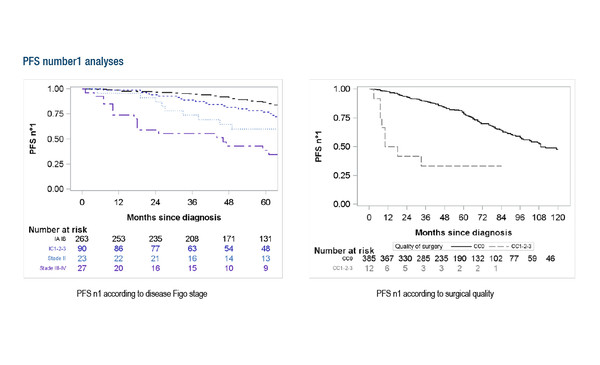Two studies presented by the French network TMRG-GINECO provide new insights into the treatment and quality of life of women with this rare cancer
At the ESMO Sarcoma and Rare Cancers Congress 2023 (Lugano, 20–22 March), results from a study of patients with ovarian sex cord-stromal tumours enrolled in a French network dedicated to rare gynaecological cancers diagnosis and management provides further evidence that chemotherapy does not have a role in this setting. According to a retrospective analysis of data from 469 adults with malignant ovarian sex cord-stromal tumours who underwent upfront surgery at 13 Tumeurs Malignes Rares Gynécologiques (TMRG) network centres – linked to the French GINECO group – chemotherapy did not prolong progression-free survival (PFS), either in the first line setting for early-stage disease (FIGO IC/II) or as perioperative therapy in patients with relapsed disease (Abstract 13O). Most patients (75.0%) had adult granulosa cell tumours and 13.0% had Sertoli Leydig cell tumours.
At initial diagnosis, 14.7% of patients received adjuvant chemotherapy and in the first line setting, only age (<70 years; p=0.004), FIGO stage (p<0.001) and surgery with complete resection (p<0.001) were associated with prolonged PFS. While chemotherapy did not prolong PFS in FIGO stage IC/II disease, bleomycin/etoposide/platinum was the most active of the regimens used and, at relapse, it improved survival compared with other chemotherapy regimens (p=0.009).
“These results are not surprising and confirm what has been previously reported in other retrospective studies (Gynecol Oncol. 2016;143:276–280) – that sex cord-stromal tumours are not particularly sensitive to chemotherapy and surgery is the only factor to impact on survival,” says Dr Domenica Lorusso from Fondazione Policlinico Universitario A. Gemelli IRCCS, Rome, Italy. “In the absence of effective drug treatment, prolonged, regular – at least annual – follow-up of patients is required, including radiological evaluation, to provide the best chance of detecting disease recurrence at the earliest opportunity, when surgical complete resection is feasible.” Ovarian sex cord-stromal tumours are very rare, accounting for only approximately 7% of all ovarian malignancies (Int J Gynecol Cancer. 2021;31:161–168), which in turn represent about 4% of solid tumours in women (Crit Rev Oncol Hematol. 2006;60:159–179). “The work done by networks like TMRG/GINECO and also the European Network of Gynaecological Oncological Trial groups (ENGOT) is crucial to study these malignancies,” she comments.
A second study from TMRG/GINECO researchers described quality of life (QoL) results in 144 survivors of non-epithelial ovarian cancer, with over half reporting changes to affective relationships and around one fifth getting divorced (Abstract 19P). In around two-thirds of patients, these changes were attributed to cancer diagnosis and treatment. Over one-third of women reported a deterioration in their sex life. However, despite the long-term nature of the changes, which were reported at a median of 6 years after the end of treatment, almost 60% of survivors did not wish to discuss these problems with their healthcare provider.
“These findings not only highlight that a large proportion of women experience long-term sexual problems after diagnosis and treatment of ovarian cancer, but that most were not willing to discuss these problems with their oncologist,” says Lorusso. “As oncologists, we need to improve our awareness of these problems and to initiate discussion of these issues during follow-up appointments. I believe this should be instigated by the oncologist rather than the patient, as patients may well consider sexual problems to be an expected price to pay for being cured. However, there are several strategies that can be implemented to help ameliorate symptoms and improve QoL,” concludes Lorusso.
Abstracts discussed:
Ray-Coquard I, et al. Impact of surgery and chemotherapy in ovarian sex cord-stromal tumors from the multicentric Salomé study including 469 patients. A TMRG and GINECO group study. ESMO Sarcoma and Rare Cancers Congress 2023, Abstract 13O
Proffered Paper Session – Rare Cancers, 20.03.2023, h. 10:50 – 12:10, Hall B1
Dubot C, et al. Long term sexual disorders among rare ovarian cancer survivors: The national GINECO case-control Vivrovaire Rare Tumors study. ESMO Sarcoma and Rare Cancers Congress 2023, Abstract 19P
Poster Display Session, 21.03.2023, h. 12:10 – 13:10, Foyer (Ground floor)





